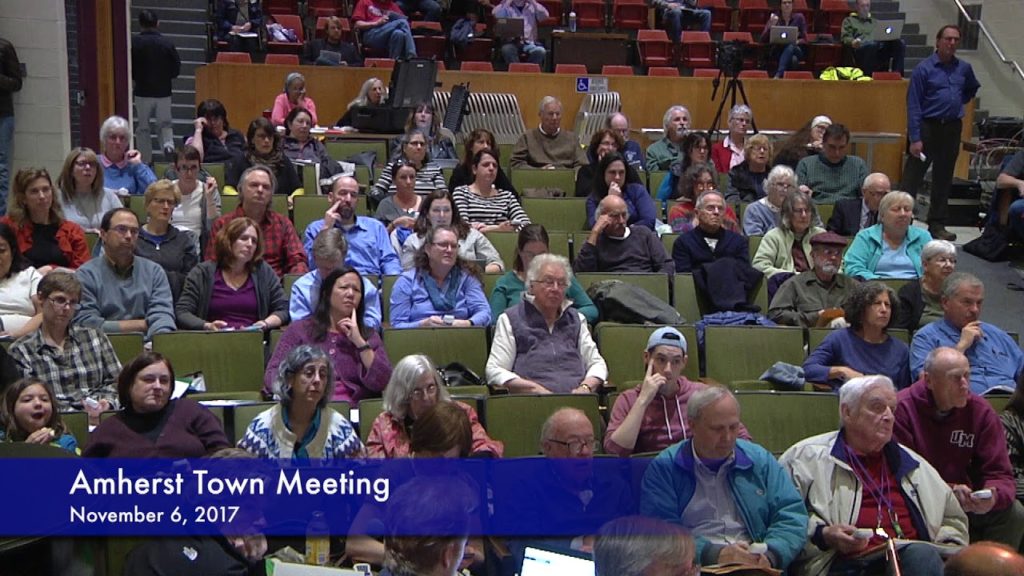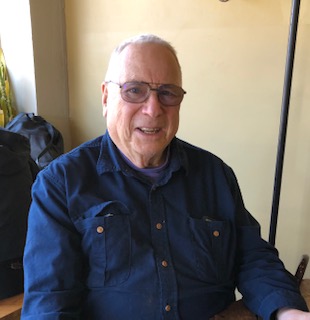A COMMUNITY ADVISORY COUNCIL PART 2: WHAT IDEAS UNDERLIE A COMMUNITY ADVISORY COUNCIL

Amherst Town Meeting. Photo: Amherst Media
by Michael Greenebaum

When members of the Town Meeting Advisory Council (TMAC) presented an idea for a Residents’ Advisory Committee to the town council on April 1, the town council was not eager to endorse it. The council referred it to its Governance, Organization and Legislation Committee (GOL), and signs are not auspicious for its eventual approval. For me, that’s OK. While I’m strongly supportive of an advisory council that would address the impacts of measures before the town council, I think that it would function best outside of town government.
I am suggesting this for two reasons. First, as a college and university town, Amherst is unlike many–perhaps most–Massachusetts communities regardless of their form of government. Although our population is diverse, very little of this diversity is represented by those in positions of power and influence in town. In fact, relatively little of it is represented by the voters who usually vote in town elections.
My first objective in drawing up a plan for a Community Advisory Council (CAC) is to meet this problem head-on by offering a real opportunity to those underrepresented in town government to participate in a meaningful way. Creating another committee that meets in the day when people work, or at night when they are caring for their families, or that meets downtown where it is difficult and expensive to park won’t work. Over the years I have been on many such committees, which genuinely paid lip service to diversity but rarely reflected it. Now that I am part of a population (the aged) that finds participation in town affairs difficult at best, I am more than ever sensitive to this gap.
A recent article in the newspaper about an Amherst teenager who is deeply interested in town governance reminds me of other untapped populations whose participation would benefit the town greatly. Because members of the CAC would not be making decisions, its membership need not be limited to voters, or citizens, or adults. What a remarkable thing it would be to have middle school or high school voices welcomed into our civic conversation. Even more remarkable would be that they would feel welcomed!
Years ago I had a taste of this kind of inclusivity. As a member of the Long-Range Planning Committee during the first of its two attempts to create a master plan as required by the state, I was in charge of one of the charettes created to enlist the ideas of community members. I worked with folks who ran the gamut of the age spectrum and my group came up with a set of ideas about how a master plan might serve the needs of the community. Our plan must have troubled some of the other members of the Long-Range Planning Committee, since they soon dismissed that first consulting group and hired a second. It turned out that the committee was more interested in land use than people use, and these second consultants devised more carefully controlled charettes, which from my perspective, were designed to elicit the results they wanted. This reinforced my understanding that the answers you get depend upon the questions you ask and it is not so difficult to devise questions that elicit the answers you want. Now that we are once again in a political season in which polling (and money) drive our politics, we should all be a little more skeptical of both questions and answers.
So genuine diversity is the first of the ideas generating this proposal. The second is disagreement.
We live in a time when disagreement has morphed into antagonism and antagonism has morphed into hatred. This is a worldwide phenomenon. Civic engagement has given way to tribal disengagement. We see it in Washington, and, sadly, we see it in Amherst.
How can we be so bad at disagreeing here? Perhaps it is partly because academia is pretty bad at it too. I used to attend faculty meetings at the University and was astonished at how they seemed to bring out the worst in everyone. Then I realized that they brought out the worst in me, too. Pretty soon I stopped going to them. It was easy, and a relief, to become detached from academic governance. Perhaps there is a lesson in that for local government too.
But perhaps the lesson for academics, politicians and local residents is to get better at disagreeing. Perhaps we should be prouder of making good arguments than of winning them. Perhaps we should learn how to hold strong convictions while we question their strength.
Many have noted that for years Amherst’s boards and committees brought unanimous, or nearly unanimous, recommendations to Amherst Town Meeting. In most cases, Town Meeting gave those recommendations unanimous, or nearly unanimous, support. But on many of the big issues involving finance, zoning, and capital improvements disagreement between boards and town meeting was pointed and volatile.
The paradigm case in recent years was the School Committee’s proposal of 2017. I won’t re-litigate that here–soon enough we will have another proposal from the School Committee and it has already received the unanimous support of the Town Council. As it happens, I support it too, but I am uneasy about the level of support from the Town Council in a town which was ripped apart so recently because residents cared so deeply and so differently about our schools. And we no longer have Town Meeting to manifest both the deepness and the differences.
My hope for a CAC is that it can be a model for the civic disagreement that is the foundation of democracy. I would expect its public debate and public reports to model rigorous deliberation within a framework of open inquiry. Right now the Town Council thinks it doesn’t need an Advisory Council to help it research the range of possible impacts of its decisions. I hope we can get them to change their minds.
In my third and final commentary on this subject I will delineate my vision of what a Resident’s Advisory Committee is and how it works. Because my vision is somewhat different from the one presented by TMAC on April 1, perhaps it can be a test case for the kind of civic disagreement we need.
